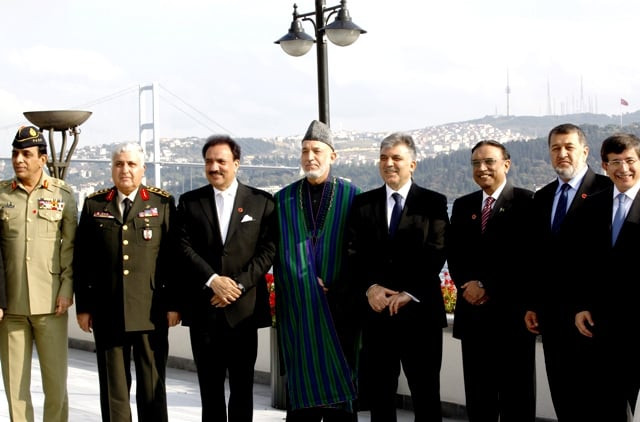A difficult peace
Afghanistan and Pakistan are at loggerheads despite the various sweeteners at the level of diplomatic rhetoric.

The question of investigation into Rabbani’s assassination is fraught with obstacles. Any investigation will lead to the terrain inside Pakistan, which is not under Pakistani control but over which Pakistan claims sovereignty. The Afghan side, feeling strong in the company of Turkish interlocutors, has waxed emotional, which was not advisable when Pakistan has reached some kind of agreement with the US over the Haqqani network in North Waziristan. That Pakistan was not overly pleased with the role Rabbani played in Kabul after the defeat of the Soviet army in Afghanistan does not help when talking about the assassination. Hence, ‘evolving’ a ‘joint mechanism’ for probing into the death will, at the most, yield a vague undertaking with no promising future.
The concrete achievement at the summit was the signing of agreements on a currency-swap between Pakistan and Turkey, and on joint military training and exercises between the militaries of the three countries. It is difficult to say whether they will offset the training facilities that India has agreed to offer to the Afghan security forces under the India-Afghanistan strategic accord signed recently. It is easy to see that Pakistan cannot let Kabul have an easy ride at the discussions that will ensue at Istanbul after the trilateral summit. Afghan President Hamid Karzai’s assertion that Pakistan has to end terrorism coming from across the Durand Line will be countered by Pakistan with complaints about similar incursions from the other side, plus details of how chaotic the administration under Karzai has been. Of course, there will be the ghost of India presiding over this exchange, compelling Pakistan not to show its hand on real policy.
The solution may be evolving between the US and Pakistan as they move closer on the modalities of talking to the Taliban. It appears that Pakistan is agreeable to being instrumental in bringing the Taliban to the table together with the Americans to help the US leave Afghanistan. Both sides have been hinting at an ‘agreement’ on this, but for Pakistan, the most crucial factor will be its presence at the table when the future shape of things in post-invasion Afghanistan is discussed. That doesn’t mean that if Pakistan’s standoff with America comes to an end, Pakistan will become a peaceful place. Its relationship with the Taliban is fuzzy at best and no one in the world can be certain, including Pakistanis, if the Taliban — of both varieties — will stick to anything they commit. Pakistan’s perennial favourite Afghan warlord, Gulbuddin Hekmatyar, has fired his latest volley of condemnation of Pakistan, which contains many of the grudges the Taliban nurse against their most generous patron. He has been quoted as saying, “In its quest for US favours, Pakistan has alienated the Afghan people and mujahideen. Now Islamabad cannot play any role in stabilising Afghanistan and restoring peace there.”
Will Islamabad keep this in mind as it seeks an international consensus behind its ‘national interest’ in Afghanistan?
Published in The Express Tribune, November 3rd, 2011.















COMMENTS
Comments are moderated and generally will be posted if they are on-topic and not abusive.
For more information, please see our Comments FAQ